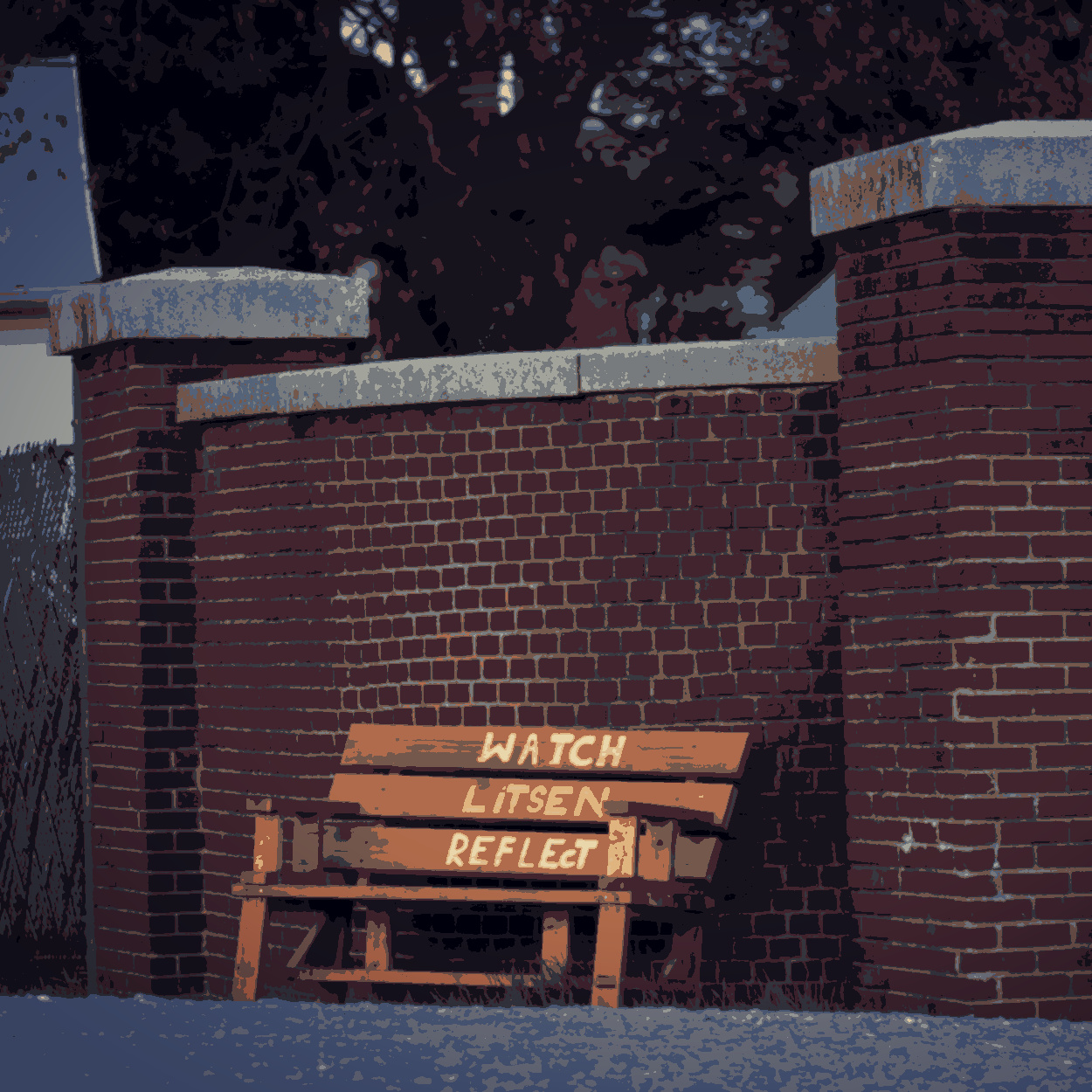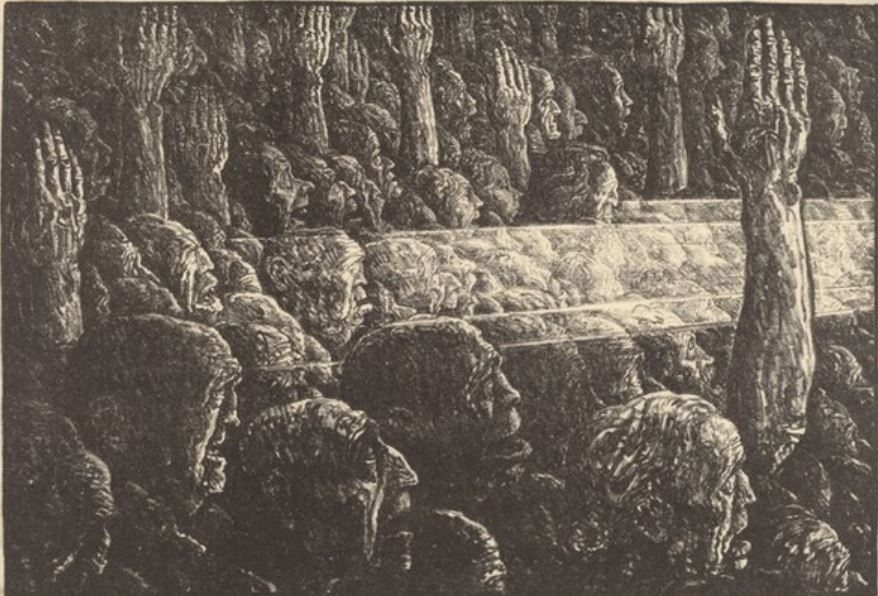The Big Idea: When we do spend time with other human beings, our tendency is to gravitate toward tension-free sameness—toward others who think much like we do. While this kind of community can be richly important and helpful to us (by helping us to consolidate our faith commitments or organize our social activism, for example), if it’s the only kind of connection we have, research confirms substantial limitations on what we’ll see—systematically obscuring NEW things that are not already in our brain or confirmed by our worldview.
Given the limitations of consorting only with like-minded people, what if—rather than avoiding deep differences—we turned toward them instead, gathering to ourselves confidants who see the world differently (people we can influence and who can influence us)—thus, creating new possibilities emerging right out of the conflict between each other’s worldviews. This kind of “trustworthy rivalry” or “rival trust” can be a great source of satisfaction and excitement and growth, as well as one largely untapped hope for improving so much on our planet. And we can almost always engage in it without compromising our ideals.
In fact, our most cherished ideals can provide the richest source of motivation to engage with others who seem so different from us. After all, why keep such treasures to ourselves? Why not share them, and in turn receive the gift of being exposed to the most cherished ideals of those with whom we appear to most profoundly disagree? Trust us—it can be very rewarding indeed!
Overstating the value of solidarity. Is that which unites us really more important than that which divides us? That’s something we all like to say and believe—but is it really true?
In one sense, of course, yes: common commitments, values, beliefs, agreements and truths are essential fabric not only of nations and communities—but also of families, marriages, and friendships. That’s why we so often gather with like-minded individuals, because, along with the practical effects of deepening and consolidating commitments, it feels good to gather in solidarity, whether that be around a cause, passion, philosophy, or sports team.
In fact, we can like this so much that differences themselves start to annoy us. Like a burr in our saddle, these differences in perspective can feel like a painful threat to endure only until we can finally eliminate them.
Our most cherished ideals can provide the richest source of motivation to engage with others who seem so different from us. After all, why keep such treasures to ourselves?
We write today to caution against both overstating the case for unity’s importance—and undervaluing the rich power of intrinsic, ubiquitous difference in perspectives and personhood all around us. Rather than a eureka discovery, we suspect that most of us already know in our guts how much we cherish these differences—beginning with the fact that we are individually unique, and unlike any others in particular. (That’s how we see people around us as well—saying to someone dear, ‘I love you.’)
What matters most to us in our daily consciousness is not humanity-in-general, nor the fact that our family, friends, enemies, and lovers are ‘humans united by their common needs.’ No. What matters most to us (in our daily lives at least) is this mother, this brother, this friend, these people.
Even with those we love, however, there can be friction, as our differences not only attract, but also, sometimes, collide. (And then when it comes to our enemies….well…!) I want to see a movie; you’d rather go for a walk. You want to take that new job across the country; I want to stay put. I think my brother’s husband would make an ideal babysitter; you don’t want our children to be exposed to what you see as his sinful lifestyle. We think our country’s president is a savior; our neighbors think he’s the devil incarnate . . .
Embracing conflict as normative and beneficial. It is fundamental that we understand this: difference is part of life, and therefore both disagreement and conflict, too, are part of life. We live in continual co-motion. We are influenced by who bumps into us or vice versa—beginning in the womb. We just can’t evade conflict; we step away to avoid hitting someone only to bump into someone else. (The well-meaning Jains walk sweeping the sidewalk ahead to avoid stepping on ants only to crush less visible microscopic critters.)
Despite all this, we walk around so often feeling like social conflicts are not normal, and perhaps even something to be avoided at all costs. Why is that?
Perhaps because early in life we humans learn and remember that many collisions or conflicts physically or psychologically hurt us. We thus learn to experience conflict itself as a bad thing—blocking our plans, bursting our bubbles, bloodying our bodies.
At the same time, to be healthy and wise as we grow, we learn that many collisions causing bother or pain are actually ‘good for us.’ Going to the dentist is the classic case —but there are so many others—from the friction of democratic systems and differences in marriage to the endless and necessary conflicts between parents and children.
Once we accept that such collisions are both ubiquitous and transformative, perhaps we can arrive at a point where disagreements and conflicts no longer elicit such a negative defense signal in our body—but instead, perhaps even elevate our desire to learn more and become larger. While our stomach will still feel an ugh, perhaps our heart will now feel a tug. We will be freer to choose our actions rather than automatically have a negative reaction when facing difficult disagreements.
There are, of course, all sorts of disagreements—not all of which are so difficult to navigate or all that consequential. The differences we focus on here are those that can alter the course of our lives as individuals and families, nations, and societies. Before proceeding further, we note that while it might be ideal for America (and beyond) to adopt positive feelings and norms around disagreement, for now, we are merely aiming to shift our readers’ attitudes about disagreement from normally negative to possibly positive.
Following William James, our hypothesis is simple: Disagreements about what we value most—conflicts over our highest ideals—are among the most essential (and even most interesting!) things about human individuals and cultures. Especially in this time, and this country, we should have a particular interest in the pregnant problem of on-going, never-finally-resolvable conflict over the highest and best ideals that we want to order our lives together. In line with our general argument for seeking the truth together, in this essay series, we affirm that we can best engage the problem of inevitable conflict over different perspectives of truth by becoming trustworthy contestants who desire mutual influence instead of suspicious enemies who aim to eliminate each other one way or another.
Trustworthy rivals? Disagreements over the purpose of life or the right way to live together almost always lead to forming rival camps. That makes sense. But the acrimony and intolerance which often follows does not necessarily make as much sense.
Granted that our desire for certainty and order is real, and we hate to have our boat rocked, but the continual need for more learning and correction is also real, and the checks and balances from interacting with others actually increase the reliability of our current understandings. Thus rivalry and disagreement need not always lead to distrust, contempt, and war. These serious disagreements and conflicts can also provide the blessed possibility for the experience we value most as humans: mutual love—in its various expressions.
Happy married couples, enduring friendships, and partnerships of all kinds consist of unique persons that continue to surprise each other in difficult and wonderful ways. They include ongoing disagreements inside their loyal relationships. Even (some kinds of) enemies can (sometimes) approach a kind of mutual respect that deepens into actual love when they learn to see each other as fundamentally trustworthy rivals, wanting only the best for themselves and the world, even if they disagree viscerally on what that “best” looks like.
Rather than a mere annoyance, these contests over the things that matter most provide the why or deep purpose that Frederich Nietzsche and Viktor Frankl said we all crave more than mere survival. We are most alive in the drama of life as we strive with each other for some purpose worthier than life itself.
Of course, this all gets really dramatic when my Eternal Ideal for society is utterly incompatible with yours. But again, the drama need not be violent. Even when we both want to ‘convert’ each other, or a ‘vote’ is pending which will decide whose values will actually hold sway—even when we have no choice but to meet as rivals—still the question remains: what sort of rivals? Rivals who see their opponent as someone to vanquish, or rivals who see each other as people we wish to persuade?
In the ‘persuasion’ process we often lose patience and imagine how efficient it would be to coerce (however nicely) others to change, even though, deep down, we know that no one can be forced to believe what they do not actually believe. While the days of the Spanish Inquisition are more or less behind us, when it comes to behavior (rather than mere ‘belief’), we do often end up seeking to compel (by social pressure or by force of law) people to do what they really do not want to do. But just as people can not be forced to believe what they do not believe, they cannot be forced (at least not forever) to do what they do not want to do (or to not do what they want to do). Yes, when it comes to whatever culture war battle is presently being fought, behavioral conformity to the will of the winners may be obtained (for a while)…but at what cost?
Differences ignored, disagreements suppressed, and conflicts pushed underground will inevitably cause a kind of social pressure to build along the deep, unhealed ideological fault lines. As a result, the sad and tragic social earthquakes of war, revolution, oppression, ethnic cleansing—the stuff of so much of human history—continue to fill the pages of our history books.
So where does this leave us? Are we who do not desire to repeat the past debacles of history left with nothing but this: to resign ourselves to a frustrating, perpetual slog of contestational persuasion? But let us pause here and ask if this drudgery of disagreement might instead be rehabilitated to become a compelling and enriching global pastime—a kind of serious cultural sport? A SuperBowl of Salvations? A World Cup of Ideals? An Olympics of the Gods?
Such game metaphors have their obvious limitations. Contests over our ideals affect our identities, our status, and our emotional and material safety in society. Psychologically, and in some cases physically, the outcomes of disagreements over values can be harsh if not fatal. The entertaining colosseum in Rome where gladiators won (or lost) everything is more apt in many cases. “Games” our social conflicts may be, in some way; but there’s a good reason they are sometimes called “culture wars.”So….what do we do when people are willing to die (or crush or oppress) for their ideals and take us down with them? How do we move in the ‘serious game’ direction, and, whenever possible, away from the bloody field of culture wars?
Roger Williams thought civic peacefulness had to be based not just on toleration but on orderly contestation over truth.
While we are sometimes drawn (with a kind of morbid, or even cathartic fascination) to the colorful fireworks that conflicts of force produce, we somehow all know that the invisible drama of a free mind and heart that silently changes is one of the most amazing experiences of life. Shakespeare is honored everywhere for his mastery of the subtle psycho-drama of human change. Even many of our dramatic modern entertainments aim to arrest our attention as we await the moment of turning—as a surprise we know must happen, but not how or when or with what consequences.
Naturally enough, for entertainment, we humans desire that the tragedies and comedies of our conflicted lives be laid bare in easily digestible half-hour sitcom segments or 2-hour cathartic dramas. While real life rarely offers such conveniently-timed resolutions, perhaps we can learn to embrace—even in our real lives and not just on the screen—the tragedies and comedies of our lives (all of which require for the “plot” some kind of conflict).
An alternative to coercive solidarity. The goal of obtaining undisturbed harmony in the self or society often leads to silencing fractious noise by force. That’s why the goal of achieving (prematurely) an end to strife for the sake of a not-entirely-true unity is not good for us. Indeed, seeking to attain perfect peace (in this world at least) has been a theoretical conundrum for philosophers, and cautioned against by some of the greatest spiritual teachers—while also acting as a brutal social policy for many tyrants. The temptation to perfect peace…perfect safety….unbroken unity….these have too often been the well- (and not so well-) intentioned path to excruciating human anguish.
Roger Williams in the 1640s tried to design a peaceful society in Rhode Island amid violent conflicts over religious dogma. He believed peaceful unity could never be imposed on a society once and for all—except by a miraculous Second Coming. Even if everyone in a community started out with the same religion or world-view, he recognized they would tend to differ in the details, leading eventually to suspicious mistrust and accusations of heresy requiring punishment—along with revolts and religious wars.
Therefore Roger Williams thought civic peacefulness had to be based not just on toleration but on orderly contestation over truth. His lively experiment with radical religious freedom of conscience and practice affirmed by law provided the social framework within which continual contestation of truth claims could proceed without necessarily disturbing the public order. Living in tension, engaged together without contempt, minimizing coercion, maximizing persuasion—these are the ways to seek the whole truth that undergirds the human struggle for justice and well-being.
In 2020 we need to learn to keep this experiment alive—and apply it to more than just religion. Given inevitable differences of perspective and rapid, continuous cultural changes, we must teach our children to expect to live in the peaceful tension that arises from contesting truth claims.
Rather than overtly persecute in the Medieval (or even early colonial) sense of the word, in modern America, we’re more inclined to shun, silence, demean or marginalize people who won’t fall into line with our beliefs and values. Tragically, this negates the possibility of mutual influence, and cheats society—cheats all of us—of all the new insights that could otherwise emerge. If this pattern continues to worsen, it holds the potential of creating such a vicious cycle of distrust that suspicious, defensive citizens will soon forget that ‘granting the benefit of the doubt’ is even possible.
But our many different beliefs—our conflicting truth claims—about why we live, who we desire to become, and where we should be heading as a human society cannot be resolved by vote or consensus alone. And they cannot be suppressed (for the illusion of social unity) without generating unhealthy resentment and eventual angry psychic or societal breakdown.
Yes, contestation over truth is problematic, but it is healthy to have and engage such a problem.
Holding affectionate space for perpetual disagreement. So how do we deal in a healthy way with this problem of contested beliefs and values that can generate larger conflicts in our personal and political lives? We are, these days, unlikely to burn each other at the stake over finer points of the doctrine of the Trinity, but our hearts sure burn with zealous anger when it comes to conflicts over ideological ‘doctrine’ regarding marriage, gender, patriotism, socialism, capitalism, social justice, civic freedom, national security, etc.
When the difference over truth impacts law, in particular—to abort or not, to bioengineer a superhuman or not, to remain a pacifist or not, to redistribute wealth or not, to marry or not—we can’t really negotiate to split the difference. So, we have to decide how to treat those whose values we do not share and may even abhor—and whose truth claims we may utterly reject as false (and as potentially dangerous delusions). This is the problem that difference raises acutely.
Is there a trick to cut through the knot tied by unresolvable differences? Is there a way to live in peaceful tension with them without ‘divorce?’ John Gottman, the renowned marriage therapist, says ‘yes’ after discovering that two-thirds of conflicts in successful marriages are respectfully managed and not resolved. He observed that people can see themselves as both partners and opponents with different or rival beliefs that they cannot with integrity compromise. In this way, he discovered that if the motives of mutual respect and love were strong enough, the marriage could include many such unresolved disagreements over beliefs or practices.
We have found that this is also the case for citizens who desire to sustain respectful, useful social collaboration along with honest contestation over serious differences.
Retraining our automatic reactions. Whenever this beautiful possibility does occur it arguably happens because abnormal (unusual) emotions kick in. Think how you feel when you say to someone or hear from someone, ‘I disagree with you.’ The ‘normal’ lizard brain erupts in us, and fight or flight feelings ‘normally’ arise. In fact, this whole essay series embodies various attempts to resist nature, as it were, and develop new habits that set aside the quite normal negative feelings we associate with disagreement—instead, cultivating positive, expansive emotions associated with learning exciting new things and finding unusual new friends. If only some do this, it will change things; if many do it, it will change everything.
No, we can’t replace the helpful “fight or flight” instinct that has served humanity well, but perhaps we can cultivate together another useful instinct to “explore and embrace.” Discovering a new, expanded kind of human relationship, a friendly rivalry, a trusted critic, is so extraordinary that we have written this series of essays to persuade everyone to ‘go out and get one of their own’…now!
In lieu of feeding so often on the normal dopamine kick we get from hearing ‘I agree with you’—or the thrilling rush of adrenalin (and the warm glow of in-group bonding) we get from nodding in virtue-signaling agreement as our comrades exclaim ‘those people are idiots’—instead of all those admittedly alluring (and actually biochemically addictive) pleasures, we’re proposing it’s time to learn to enjoy the deep bonding pleasure we can feel from someone saying, ‘I respect you, and I disagree big-time with you too.’
From many years of dialogue engagement we concur with John Gottman that most efforts to bring ideological poles of difference (e.g., pro-life vs. pro-choice) cleanly together for harmonious compromise have built-in limitations—in families or societies. We need to understand how empathically understanding difference does not automatically (or even ultimately) resolve many serious disagreements. Indeed, deep mutual understanding can actually sharpen the points on our swords! And empathy—useful indeed for deep understanding—is not the end-all solution for our disagreements either. After all, empathy can exist between rival soldiers forced to ultimately try and kill each other.
The way forward is through better disagreement. We can shift our attitudes and pick up skills that ease the negative stress and embrace the positive tension of living among fellow-travellers who strongly disagree with us. We can teach our children to expect disagreement-laced peaceful tension as the normal course of life. (When challenged on life’s journey we can either model road rage or equanimity—in any case the kids will take note and drive like we do under stress). When facing a hard question from a critic we can either fearfully evade it, saying, “Let’s not go there!” or we can confidently open the can, honestly asking, “How did you come to that position?”
This attitude will not be lost on observers. Want to predict the future for America (or any diverse society)? Just watch how influential voices in society are acting now. We cannot avoid the black swan events ahead or the consequences for the problems we have caused, but we can avoid having contempt for our troublesome human teammates—the ones we need to trust us when our prospects for surviving (let alone thriving) are grim. Our social problem of mistrust today is not one we can solve with mere communication techniques. It will take a change of attitude, one that takes self-critical contemplation, asking ‘do I really believe I should be open to the influence of my critics?’
This takes guts. But it’s so crucial—and not something we can successfully fake either. Our disrespect and suspicion shout loudly, no matter how we disguise it with civil words. As much as any dangerous virus, our real feelings about those who disregard or disagree with us are contagious.
Helpful attitudes, of course, can also go viral. There is no neutral ground really. We are all carriers of attitudes that display either deadly disregard or vitalizing respect for our disagreeable opponents. We are each spreading either the disease or the cure. The future life of our country depends on which attitude ultimately takes over. Our fellow citizens are observing us, as we are them. And our precious children are watching us all —witnessing how we’ll navigate the days ahead.
Of course, there are limits to tolerating that which is harmful for all. When we stand up and resist or fight such things, however, we would argue that the outcome of conflict is similarly determined ultimately by the attitude of the resisters or fighters toward their opponents. Is it the Gulag or the Marshall Plan? Catch and release or Guantanamo?
The model of most import that we provide our followers combines wisdom with courage in this foggy world of disagreement. When must we withstand, and when should we stand with, our disagreeable opponents? As a rule, tolerance is better for everyone than persecution, but it is the weakest of social virtues—usually a thin disguise for contempt or utter disregard for ‘those who don’t get it.’
A healthy society thrives on respectful engagement of differences, not mere toleration. Each generation learns how they are expected to engage (or not!) with critics, rivals or opponents. Do they evade the possibility for mutual influence or do they jump into the ring of mutual persuasion? Someone needs to desire this kind of engagement or it will not happen—and the future of our country and beyond will continue to devolve into the angry mistrust of divorcees that are stuck living in the same house.
Equality and liberty in tension. To make this issue of engaging difficult disagreements more concrete, let’s consider a specific case that has troubled humanity a long while and is currently very much in question.
When the American founders set forth a preliminary working charter of belief for the USA they settled on this language: “We hold these truths to be self-evident that all men are created equal and endowed by their Creator with inalienable rights of life, liberty and the pursuit of happiness.”
This noble statement began by including principles and beliefs (italicized here) that were and still are controversial today. Two of them, equality and liberty, reflect the inevitable social tension between togetherness and apartness, community, and individual.
In reality, no one is fully equal to anyone else in DNA or upbringing, and likewise, no one is ever completely at liberty, given their limited resources and abilities, and given the matrix of inextricable interdependence within which each of us necessarily “lives and moves and has our being.” Against this backdrop, the ideal of equality crumbles when it fails to engage with inherent differences of individual abilities and needs; and the ideal of liberty becomes tyrannical when it fails to engage with the reality of interdependence. The action of healthy politics takes place between these ideals—balancing the reality and the needs of both community and individual.
For example, should there be a compulsory public school system that socializes individuals with a core curriculum? Should there be legal limits to how much money you make and how much should be spread around? Should there be a legal limit to the number of children you can have? Can you abort a pregnancy? Should you be able to genetically produce superhumans if you desire and have the means? Should you have to go to war if you don’t believe any war is justifiable? Should there be a social distinction between “employer” and “employee” at all, or should all be both owners and workers? Should fines or punishments be adjusted based on one’s ability to endure or pay (e.g., a $300 speeding ticket is a month’s rent for some, and years in prison might be bad for the wealthy, but economically murder for the poor)? The list is endless.
The point is that none of these problematic questions would exist if we were all the same. And yet, the tragedies of a variety of unfair differences are devastatingly real. Now let’s introduce a controversial thinker into this conversation. Though it might come as a surprise to people unfamiliar with his writings, Karl Marx, so often associated with movements that have ‘equality’ as their watchword, took pains to point out just how defective this principle of equality is when used to address real human needs:
“Right by its very nature can consist only in the application of an equal standard; but unequal individuals (and they would not be different individuals if they were not unequal) are measurable by an equal standard only insofar as they are brought under an equal point of view . . .”
And, as Marx points out, even such “equal points of view” distort the full humanity of the person, since they view the person “from one definite side only, for instance, ….only as workers and nothing else is seen in them, everything else being ignored.”
Whatever our political views, many on the right and left and in between would agree with Marx who put the problem succinctly—“…we have no desire to exchange freedom for equality.” But then, what do we actually do to improve the well being of all in a society that aims to freely thrive? Must we sacrifice one value for the other in some final battle?
Like many other challenging conversations, this conversation illustrates well the need for engaging our disagreements forthrightly and fairly. Do we not think and feel more like we could ‘live in the same house’ when we realize we both know we have common problems that require decisions that make us unequally uncomfortable? In this specific exchange, do we not conclude that the perennial tension between liberty and equality in light of the unfairness of differences is actually the price we pay to engage freely in this stretching experience of social life?
We’d suggest that it’s precisely these distinctive differences of values (and associated disagreements) that make it possible to love some one or enjoy some thing more than just anyone or anything.
And yes, the existence of differences also make possible injustice and inequality. As a result, we naturally compare our lives and then focus on the unfair givenness of social privileges based on birth, upbringing, class, etc. This often causes momentous disagreements between groups that feel justified in their social standing and those that feel oppressed.
As a general theme, we have been asking, ‘How do we do something that addresses these disagreements with more persuasion and less coercion?’ Almost all of religion, social theory, and politics centers on that question. Do we try to force or engineer societies so they cannot provoke or allow envy? Do we just try to let things naturally work out so only the most talented or powerful or well-equipped or just plain lucky thrive?
Justice in the sense of equalizing differences that by some standard ought to be adjusted is an ancient and modern goal that is never fully achieved. The results of human efforts for justice zigzag dynamically across human history—perhaps hitting the optimal point for an instant on the way to the next disagreeable, suboptimal reality. In blunt terms, then, a healthy society aiming for justice must face the problem of managing expectations for change that continually oversteps or falls short of the goal. Without giving in to exhaustion or cynicism, we in our country have to rekindle and sustain enthusiasm for the contestation over justice.
Another way to be together. Disagreements will “always be with us” as well as the crucial desire for orderly collaboration. To keep our conflicts from becoming contemptuous brawls, to make them useful for social improvement, it’s time to cultivate new attitudes that actually increase the chance of positive change and social goodwill because winners and losers on a given issue desire to continually influence each other in their community of trustworthy contestants.
Experiment with and then adopt this positive attitude toward disagreement and reap the personal and societal rewards from so doing.
To get there, it is most important that people develop a particular new attitude of patient confidence, namely, that by engaging hearts and minds with their critics and rivals, truth will win out over honest mistakes and evil corruption. This means embracing disagreement and conflict as an aspect of seeking the whole truth out of reach for finite human minds. By honestly engaging a critic, you can thus expand your perspective without impairing your integrity.
This attitude, call it perhaps “engaged patience,” expects your life to normally include intense emotional and practical pressures for rapid reassessment of truth. But it also allows you to engage impatient rivals and critics without fear of ‘losing it.’ In a sense, you can thus expect to relax in the fire—looking for eventual mutual change without forcing it, and supported by a backdrop of mutual respect as seekers for truth opening a new desire to live together even, if necessary, without achieving a consensus or resolving your disagreement. Then the increase in mutual trust allows for change to happen—yielding an invisible mutual conversion to a new perspective that embraces and endures the peaceful tension of contesting unresolved differences with trustworthy rivals and critics.
This series is an effort to increase the desire of readers to experiment with and then adopt this positive attitude toward disagreement and to reap the personal and societal rewards from so doing. Given the urgency of various crises in our society today, and the desperate straits in which too many people find themselves, it is time for bold action.
Assisted by a safety net. Experiment—without betting the whole American farm. Above all, extend trust now, yet verify quickly. Then repeat and repeat until this settles into your heart and relationships—and spreads into our communities around us. Whatever else it might take to reach a better world, we’re confident this is part of the solution—helping us move along until we have more perfectly embodied that ideal of ‘e Pluribus Unum’…and have created or refounded ourselves as a really pluralistic republic of trustworthy neighbors.
On a broader cultural and political level, we are proposing fresh efforts towards a new norm of engaged patience that expects to integrate continual bothersome inter and intra-tribal rivalries and irreconcilable beliefs within a healthy, truth-and-justice-seeking society. As this attitude develops it will make place for a newly rehabilitated belief in the social benefit of engaging mutual persuasion.
In sum, may we consider that our differences and ensuing disagreements provide the occasions for both our pains and pleasures, and the envies and loves that enliven our human existence. The potent truth we emphasize here is that it is time for us to make greater space in our lives and communities for honestly and respectfully engaging in continual contests of mutual persuasion over inevitable disagreements in beliefs about truth and values. Rather than unrealistic expectations, we believe these can be absorbed patiently into any social order that learns to live in the tension of freedom and justice, truth and peace.
The Big Invitation: Find someone with whom you seriously disagree—and take them to lunch. Let them know you want to understand them better and engage in a conversation for mutual influence even if you never end up agreeing. Don’t underestimate how powerful it is to say sincerely to someone: “I want you to be part of my life, even though we will likely always have strong differences.” Happily married people know this by experience!
Or try a Living Room Conversation, or a Better/Braver Angels event (both available online), and read The Way of Openness for public conversations made available by an organization Randy helped create, WorldTable.co.

















